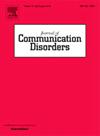Longitudinal predictors of reading ability in children with CI learning to read in Swedish
IF 2.1
3区 医学
Q2 AUDIOLOGY & SPEECH-LANGUAGE PATHOLOGY
引用次数: 0
Abstract
Purpose: This study investigated long-term predictors of reading development (phonological decoding, word recognition, and reading comprehension) in 24 children with cochlear implants (CIs). Method: The predictor variables were age, sex, nonverbal intelligence, working memory, paired associate learning, receptive vocabulary, phonological skills, grammatical knowledge, age at implantation, speech perception, and reported interest in reading. The children's mean age was approximately 7;8 years at the start of the study and they were then measured at three time points. The first and second assessments took place approximately 13 months apart, and the children were approximately 11;8 years of age at the third time point. Results: Decoding ability at age 11 was associated with early measures of nonverbal cognitive ability, visual-verbal paired associate learning, and grammatical knowledge when 0.05 was used as significance level but none of them remained significant after correcting for multiple comparisons. Several predictor variables from earlier measurements were significantly related to reading comprehension at age 11. The predictors that remained significant after Bonferroni correction were receptive vocabulary and grammatical knowledge. Discussion: The findings from this research suggest that early exposure to hearing and language, in particular vocabulary and grammar, is associated with reading outcomes at age 11.
学习瑞典语阅读的CI儿童阅读能力的纵向预测因素。
目的:本研究探讨了24名植入人工耳蜗儿童阅读发展的长期预测因素(语音解码、单词识别和阅读理解)。方法:预测变量为年龄、性别、非语言智力、工作记忆、配对联想学习、接受性词汇、语音技能、语法知识、植入年龄、言语感知、阅读兴趣。在研究开始时,儿童的平均年龄约为7、8岁,然后在三个时间点对他们进行测量。第一次和第二次评估相隔约13个月,在第三个时间点,儿童约为11.8岁。结果:11岁儿童解码能力与非语言认知能力、视觉-语言配对联想学习和语法知识的早期测量结果在0.05为显著性水平时相关,但经多重比较校正后均不显著。早期测量的几个预测变量与11岁时的阅读理解显著相关。在Bonferroni纠正后,接受性词汇和语法知识仍然是显著的预测因子。讨论:这项研究的结果表明,早期接触听力和语言,特别是词汇和语法,与11岁时的阅读成绩有关。
本文章由计算机程序翻译,如有差异,请以英文原文为准。
求助全文
约1分钟内获得全文
求助全文
来源期刊

Journal of Communication Disorders
AUDIOLOGY & SPEECH-LANGUAGE PATHOLOGY-REHABILITATION
CiteScore
3.30
自引率
5.90%
发文量
71
审稿时长
>12 weeks
期刊介绍:
The Journal of Communication Disorders publishes original articles on topics related to disorders of speech, language and hearing. Authors are encouraged to submit reports of experimental or descriptive investigations (research articles), review articles, tutorials or discussion papers, or letters to the editor ("short communications"). Please note that we do not accept case studies unless they conform to the principles of single-subject experimental design. Special issues are published periodically on timely and clinically relevant topics.
 求助内容:
求助内容: 应助结果提醒方式:
应助结果提醒方式:


